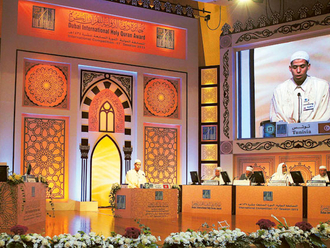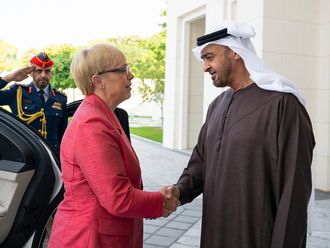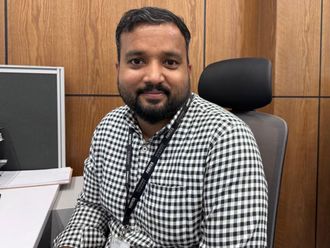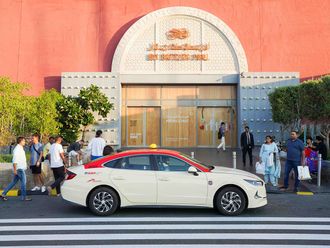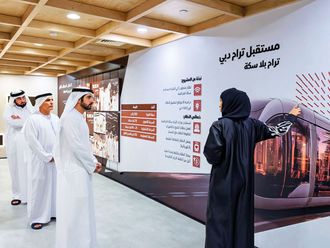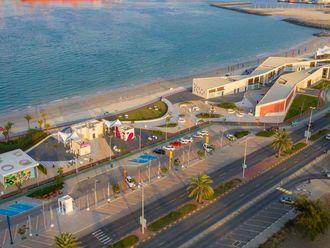"Fruit and vegetables produced locally under the supervision of the ministry of agriculture and fisheries are not only very safe to eat but they are better in quality when compared to some imported products," said Engineer Abdullah Rashid Al Mualla, director of the ministry's central region in Al Dhaid.
Al Mualla |
"We have to teach our farmers to pack their products properly as it not only enhances the life of products but also attracts customers," he said.
Some of the common locally produced agri-products are: tomato, eggplant, pepper, onion, potato, lettuce, cabbage, cauliflower, mango, limes and citrus fruits.
Al Dhaid is a major agricultural centre with farmers cultivating an impressive range of vegetables and fruit.
Al Mualla said that people should not discard the local produce only because they have the option of buying imported vegetables and fruit.
"Our products are not only of better quality but are also cheaper," he said, adding that the local community should come forward to encourage local farmers by buying locally grown crops.
Al Mualla said that the ministry provided farmers with the best seed and expert advice to get the best of the crop. He said that they also provided various services to local farmers on modern farming techniques to increase their crops.
Pesticides
"Whenever a farmer comes for advice to us, we send our experts to his farm, take soil and water samples, send them to laboratories and then give him advice about what type of plants or crops he should grow," he said.
The ministry's central zone, he said, discourages the use of pesticides. There is strict control on the use of pesticides.
Al Mualla said that they had also developed farms to grow organic vegetables without the use of pesticides and fertilisers. "The experiments have been going very well and very soon we will be able to provide organic vegetables in the market," he predicted.
He said that they were also experimenting in growing crops using hydroponics systems to suit UAE land conditions.
| Officials at a farm where the hydroponics system is being used. ©Gulf News |
"If this system is adopted commercially, it would not only help reduce the use of water, but also help further improve the quality of our crops," he observed.
According to Al Mualla, the number of farmers is increasing, as there is a good profit margin in cultivation. Although, a larger number of farms have turned into barren land over the last few years because of the shortage of water in certain areas, a larger number of new farms are coming up in new areas with enough water resources.
"The total number of farms this year is 5,718 in the central zone as compared to 5,491 last year, recording a massive increase of 227 new farms this year," Al Mualla said, adding that salinity and shortage of water were the two main reasons for the closure of farming projects in certain areas.
But, he said, ministry experts were working on projects to develop new areas of cultivation.
He said that they had enough water to irrigate the existing farms. "The new irrigation systems developed by the ministry have reduced the use of water by 50 per cent. We are also taking a number of other steps to meet future water requirements for cultivation," he said, adding that the ministry was working on a comprehensive plan to drill big wells to irrigate the land.
Al Mualla, who got his PhD degree on plant production in 1985, has dedicated his career to developing the agricultural sector in the UAE. He has served in various important positions in the Ministry for the last 15 years.
He is now the director of the central agricultural zone, the second biggest zone in the UAE after Abu Dhabi. Two other agricultural zones are in Ras Al Khaimah and Fujairah.
According to Al Mualla, the total agricultural area in the central zone is 192,899 donums (A donum is equal to 1,000 square metres, and 10 donums is equal to approximately one hectare).
Some 181.953 donums can be irrigated while about 5,700 donums cannot be planted at all. About 11,056 donums can be cultivated but have not been so far.
Major crop
The major crop is dates. There are about 2.8 million date palm trees in the area. Some 978,000 are productive, while 1.8 million are so far non-productive mainly because they are under-age.
Animal fodder is grown on an area of about 30,621 donums, while vegetables are grown on an area of 24,000 donums.
| Workers of the experimental centre watering plants. ©Gulf News |
Three types of irrigation system are used. Sprinklers are used to irrigate the animal fodder crops. The dripping system is used for vegetables and bubblers are used for fruit crops.
The ministry has also set up an experimental station. Its engineers are always busy doing experiments to improve the quality of the local crops at the centre. They invite farmers to their centres and advise them about new techniques to increase both the quality and quantity of their crops.
They also teach them how to use modern techniques and what steps should be taken to control crop diseases.


